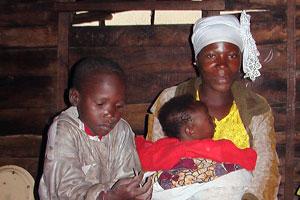
Caritas gave victims of sexual violence treatment and counselling and supported child soldiers in their reintegration into society.
Credits: Caritas
Pots, plates, cutlery, soap, shirts, blankets….the list of things you need if you’re forced to leave your home and possessions behind is endless.
These are just some of the items Caritas has been providing over the past six months to the people who have fled their homes due to fighting between the Government and rebels in Congo’s troubled eastern region.
“It’s intolerable that you have one and a half million people who haven’t got a home, aren’t protected, are exposed to sexual violence, haven’t got medicine or clothes…all this in a country which is rich,” says Dr Miteyo, national director of Caritas Congo. “It’s this contradiction which pulls at my heartstrings.”
The breadth and depth of the crisis is hitting the people of Congo hard on every level. They not only have lost their homes and possessions, but their jobs are left behind, their fields go unplanted, their children risk being recruited to rebel ranks and the women stand in the shadow of brutal and dehumanising rape. Fear penetrates everything as their lives are trodden upon by soldiers and rebels alike.
Caritas’ work in eastern Congo goes far beyond the provision of household items, food and water. In the emergency programme which has just concluded it supported dozens of hospitals and health centres with medicines and other items, it gave victims of sexual violence treatment and counselling and supported child soldiers in their reintegration into society.
Other initiatives promoted by Caritas include teaching women a skill such as sewing, so they can enjoy some economic independence, and raising awareness about issues such as AIDS.
It is Congo’s wealth of resources which is at the root of the current conflict. Gold, tin and coltan – which is used to make mobile phones – are just some of the resources lying below the feet of the impoverished Congolese who live in terror.
“We call these people ‘les sans voix’ [the voiceless],” says Dr Miteyo. “All they want is peace and a right to a life where they have a home and they can take care of themselves.”
“The most important thing at moment is that the Congolese Government and the international community sit around a table and discuss the ‘rules of the game’ to ensure the transparency of the exploitation of resources is established so that the conflict is stopped,” says Dr Miteyo.
Congo’s bishops have been actively urging the Congolese people, the Government and the international community to take responsibility in the current situation. Their attempts to raise awareness have ranged from a visit to the UN Security Council in New York to a trip to the city of Goma to offer solidarity to people affected by the conflict.
“Many people continue to die both in the east and in the north of Congo. It’s so sad that not enough is being done to stop this situation and help people live their lives,” says Dr Miteyo. “After all, we’re all the same human beings created in the image of God.”
Meanwhile, Caritas is preparing to launch another emergency appeal to provide support for hundreds of thousands of people. With the funds its raises, it will help the people of Congo for another nine months with the physical, social and psychological effects of the conflict and the breakdown of life as they know it.
